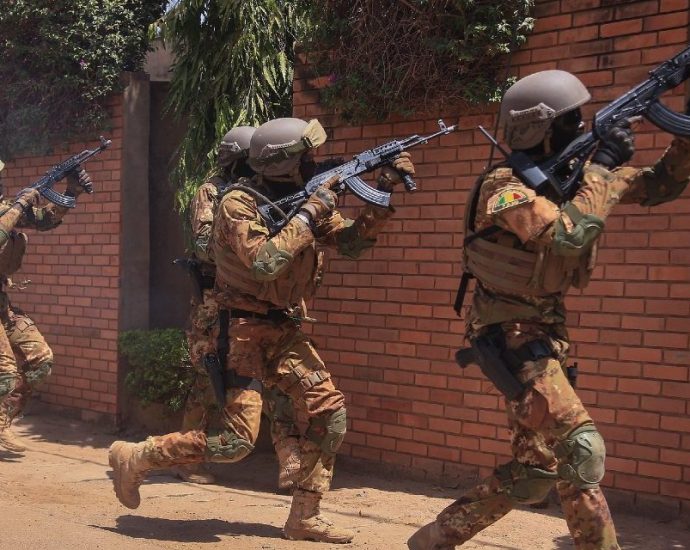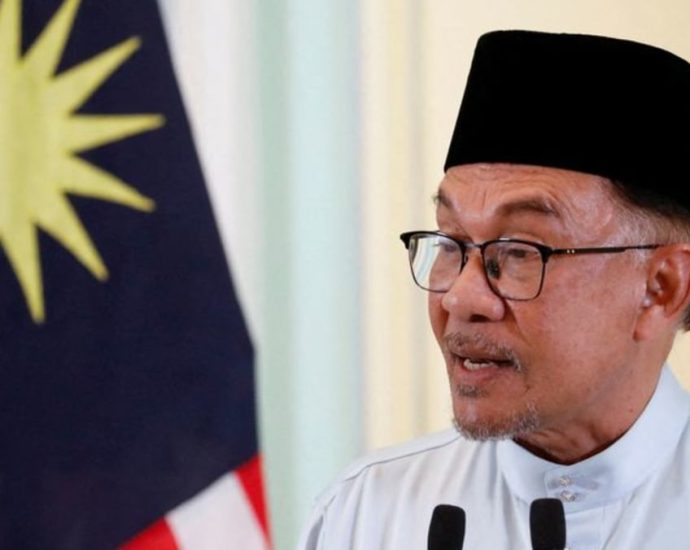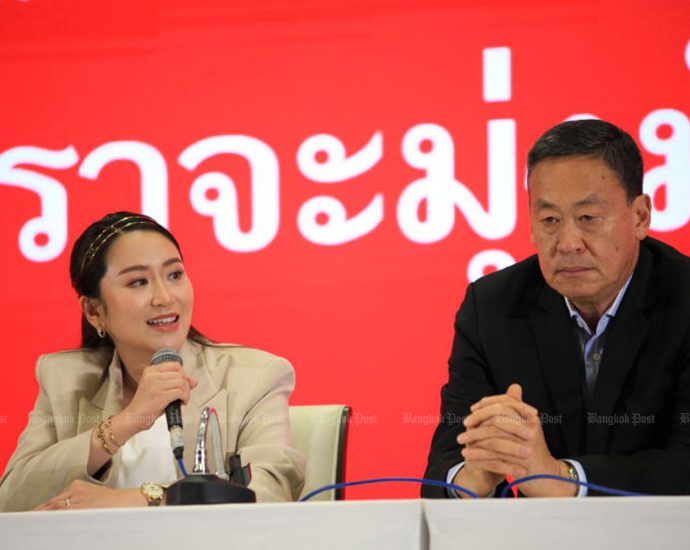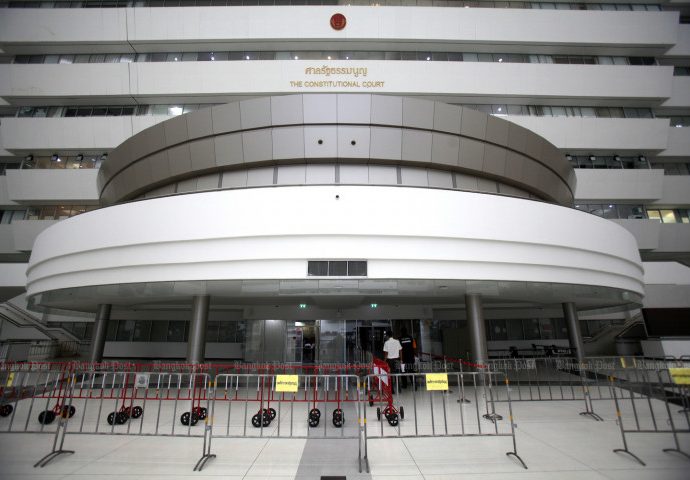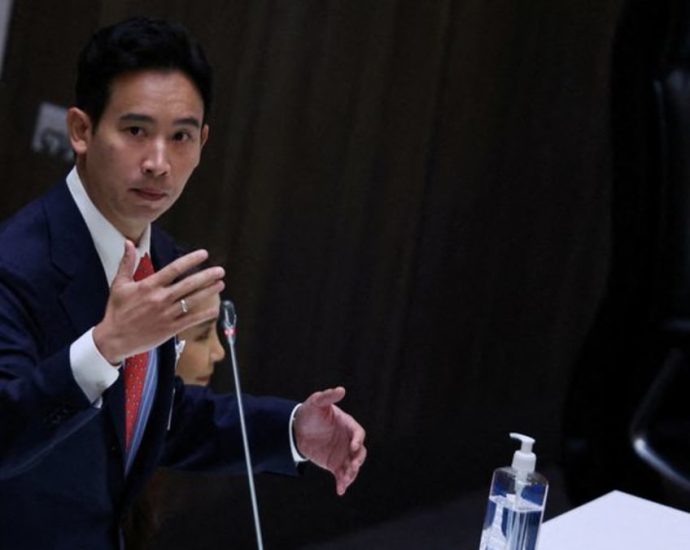4m speed pills seized in Khon Kaen
Detained driver said he was to be paid B80,000 to transport drugs to Saraburi
PUBLISHED : 18 Jul 2023 at 15:57

KHON KAEN: A drug courier has been arrested with than 4 million speed pills seized in Phon district of this northeastern province.
Kittisak Manas, 49, of Saraburi province, was arrested after police stopped and searched the Honda CR-V with Bangkok licence plates that he was driving at a checkpoint in Phon district of Khon Kaen.
Police had obtained information earlier that a large quantity of speed pills would be smuggled from Pak Khat district of Bueng Kan province into the Central Plains, said Pol Lt Gen Yanyong Vejosot, chief of Provincial Police Region 4. Smuggling gangs often made their runs on weekends, said Pol Lt Gen Yanyong.
Police then set up road checkpoints in areas under the jurisdiction of Region 4 to search suspected vehicles.
On Saturday, officers spotted a suspected Honda CR-V arriving at a checkpoint in front of Phon Hospital on Mittraparb Road in Phon district. The driver tried to abandon the car but he was detained.

Senior officers stand next to the seized drugs at a media briefing in Khon Kaen on Tuesday. (Photo: Chakrapan Natanri)
A search found 10 fertiliser sacks inside the vehicle. They contained 4.07 million speed pills.
During questioning, Mr Kittisak told police that he was unemployed and had come to know a man aged 50 at a food shop in Saraburi. He met the man on several occasions and they became close. The man offered him a job to drive the CR-V from Bueng Kan to deliver to a customer in Saraburi for 80,000 baht.
Mr Kittisak said he took the job and went to Bueng Kan on Friday. He drove it along Mittraparb Road heading to Saraburi on Saturday morning before seeing the police checkpoint in Phon district.
He claimed he was not aware the fertiliser sacks contained drugs, adding that it was the first time he had done this kind of work, said Pol Lt Gen Yanyong.
Mr Kittisak has been held in police custody at Phon police station for legal action. The investigation is being expanded to arrest other people involved.
From ‘very quiet’ newcomer to Tampines GRC MP: Cheng Li Hui’s career before resigning over affair

According to media reports, Ms Cheng’s hobbies include brisk walking and exercising in the gym.
“From being a girl scout to assisting at Meet-the-People sessions since 2003, helping people has been such an integral part of my life. In a way, politics is the next phase,” she told ST.
“Whether it’s volunteering or working in the office, I interact with a lot of people. I’d like to think I’m not too bad at interaction and that’s really important.”
2. HER BUSINESS BACKGROUND
Ms Cheng was previously the deputy chief executive officer and executive director of engineering firm Hai Leck Holdings, which was founded by her father Cheng Buck Poh.
She then became a non-executive, non-independent director of the company in Jan 2018, before stepping away from the role in Oct 2019.
In addition, Ms Cheng is also an independent director of Sheng Siong, having been appointed in December 2021.
She also served on the board of NTUC Foodfare in 2019, before it merged with NTUC Fairprice in September that year.
3. A “TALK LESS, DO MORE” PERSON
Ms Cheng was fielded in PAP’s Tampines GRC team during the 2015 General Election. Along with Mr Baey Yam Keng, Mr Desmond Choo, Dr Koh Poh Koon and Mr Masagos Zulkifli, she was elected to Parliament with about 72 per cent of votes.
Ms Cheng took over from former Cabinet minister Mah Bow Tan, who described her as “talk less, do more” type of person.
“She’s also very quiet that sometimes people don’t know that things get done,” said Mr Mah at the unveiling of PAP’s team for Tampines in 2015.
Guns for hire: a season for mercenaries

After a band of mercenaries tried to oust the government in Maldives back in 1988, I asked a Maldivian diplomat, using a familiar military catchphrase, about the strength of his country’s “standing army.”
“Standing army?” the diplomat asked with mock surprise, and remarked perhaps half-jokingly, “We don’t even have a sitting army.”
With a population of about 250,000 around that time, Maldives was one of the few countries with no fighter planes, combat helicopters, warships, missiles, or battle tanks – an open invitation for mercenaries and freelance military adventurers.
As a result, the island nation’s fragile defenses attracted mercenaries and bounty hunters who tried to take over the country twice – once in 1979, and a second time in 1988.
Although both attempts failed, the Indian Ocean archipelago refused to drop its defenses. It not only initiated a proposal seeking a UN security umbrella to protect the world’s militarily vulnerable mini-states but also backed the 1989 “International Convention against the Recruitment, Use, Financing and Training of Mercenaries.”
In the US, a mercenary is called a “soldier of fortune,” which is also the title of a widely circulated magazine, subtitled the “Journal of Professional Adventurers.”
The adventures – and misadventures – of mercenaries have also been portrayed in several Hollywood movies, including The Dogs of War, Tears of the Sun, The Wild Geese, The Expendables, and Blood Diamond, among others.
Wagner hits the headlines
When the Russian Wagner Group hit the front pages of newspapers worldwide, it was described as a private mercenary group fighting in Ukraine.
The New York Times said on June 30 that the Wagner Group provided security to African presidents, propped up dictators, violently suppressed rebel uprisings, and was accused of torture, murder of civilians, and other abuses.
But the recent failed coup attempt by Wagner threatened, for a moment, the very existence of the group.
A military adviser to an African president dependent on mercenaries implicitly linked the name of the group to the German composer Richard Wagner.
And the official was quoted as saying, “If it is not Wagner any more, they can send us Beethoven or Mozart, it doesn’t matter. We’ll take them.”
A July 14 report on CNN quoted a Kremlin source as saying the Wagner Group, which led a failed insurrection against Russian President Vladimir Putin in June, was never a legal entity and its legal status needs further consideration.
“Such a legal entity as PMC Wagner does not exist and never existed. This is a legal issue that needs to be explored,” Kremlin spokesnan Dmitry Peskov said.
Peskov refused to disclose any further details on the meeting between Wagner head Yevgeny Prigozhin and Putin that reportedly took place several days after the aborted rebellion in June.
Besides Ukraine, mercenaries have been fighting in Central Africa, Mali, Syria, Yemen, Iraq and Libya. In Syria, there was a paramilitary group called the Slavonic Corps providing security to President Bashar al-Assad battling a civil war – followed later by the Wagner Group.
And in Mali, there were more than 1,500 mercenaries fighting armed groups threatening to overthrow the government.
US frowns on mercenaries – sometimes
Ironically, the US, which used the Blackwater Security Consulting Group during the American occupation of Iraq, has imposed sanctions on several African nations deploying mercenaries.
US Secretary of State Antony Blinken said early this month that the United States was imposing sanctions on several entities in the Central African Republic for their connection to what he called the transnational criminal organization known as the Wagner Group and “for their involvement in activities that undermine democratic processes and institutions in the CAR through illicit trade in the country’s natural resources.”
“We are also designating one Russian national who has served as a Wagner executive in Mali,” Blinken said. “Wagner has used its operations in Mali both to obtain revenue for the group and its owner, Yevgeny Prigozhin, as well as to procure weapons and equipment to further its involvement in hostilities in Ukraine.”
The United States has also issued a new business risk advisory focused on the gold industry across sub-Saharan Africa. Specifically, the advisory highlights “how illicit actors such as Wagner exploit this resource to gain revenue and sow conflict, corruption, and other harms throughout the region.”
Death and destruction have followed in Wagner’s wake everywhere it has operated, and the United States will continue to take actions to hold it accountable, Blinken said.
Stephen Zunes, professor of politics and international studies at the University of San Francisco, told Inter Press Service (IPS) it is certainly good that the United States is finally taking leadership in opposing the use of mercenaries.
The Iraq war, which then-senator Joe Biden strongly supported, relied heavily on the use of mercenaries from the Blackwater group. Similarly, during the Cold War, the US Central Intelligence Agency used mercenaries to support its military objectives in Latin America, Southeast Asia, and sub-Saharan Africa.
“Whether such actions targeting the Wagner Group is indicative of an actual shift in US policy or simply a means of punishing a pro-Russian organization remains to be seen,” Zunes said.
Simon Adams, president and chief executive of the Center for Victims of Torture, told IPS that throughout history, big powers have often used mercenaries. From trying to hold back anti-colonial struggles to the horrors of the Cold War in Latin America or Africa, there is nothing new in that.
“But I think the big change is that the international community has become more intolerant of these guns-for-hire and privatized armies who believe that they can operate outside of international humanitarian law, and are often rampant abusers of human rights,” he said.
And it is much harder these days for their state sponsors to deny responsibility for their actions, he added.
The Wagner Group has been implicated in numerous atrocities in Ukraine, the CAR, and a number of other places, he said.
“They deserve all the opprobrium that has been heaped upon them. The challenge now is not just to sanction them, and to try to hold the main war criminals accountable under international law.”
The bigger challenge is to ensure that no other big state or major power engages in these same nefarious practices the next time it suits their own partisan interests to do so, Adams said.
Meanwhile, according to an article in the National Defense University Press, private force has become big business, and global in scope. No one truly knows how many billions of dollars slosh around this illicit market.
“All we know is that business is booming. Recent years have seen major mercenary activity in Yemen, Nigeria, Ukraine, Syria and Iraq. Many of these for-profit warriors outclass local militaries, and a few can even stand up to America’s most elite forces, as the battle in Syria shows.”
The Middle East is awash in mercenaries. Kurdistan is a haven for soldiers of fortune looking for work with the Kurdish militia, oil companies defending their oilfields, or those who want terrorists dead, according to the article.
“Some are just adventure seekers, while others are American veterans who found civilian life meaningless. The capital of Kurdistan, Irbil, has become an unofficial marketplace of mercenary services, reminiscent of the Tatooine bar in the movie Star Wars – full of smugglers and guns for hire.”
This article was provided by the Inter Press Service / Globetrotter News Service.
Pita: No backing down from lese-majeste reform
Opposition to Move Forward agenda a ‘broken record’, leader says on eve of last-chance vote
PUBLISHED : 18 Jul 2023 at 15:20

Pita Limjaroenrat says he is willing to slow the pace of the Move Forward Party’s ambitious reform agenda if he forms a government but it would not retreat from its plan to amend the lese-majeste law.
In an interview with Reuters on Tuesday, Mr Pita described efforts by the military establishment to block him as like a “broken record” and said Thailand had entered a different era with the public eager for change.
Mr Pita, 42, will contest a parliamentary vote on the premiership on Wednesday for the second time, after failing last week to win the required backing of more than half of the legislature, as the conservative, military-appointed Senate closed ranks to deny him the top job.
If he fails to win a majority in parliament on Wednesday, Mr Pita is expected to give way and let coalition partner Pheu Thai nominate businessman Srettha Thavisin for prime minister the following day.
“It was absolutely expected, the same thing, same venue. Broken record. But the sentiment of the era has changed,” he said.
“Despite what happens tomorrow there has been progress in society. They demand something new, something fresh.”
Move Forward was the surprise winner of the May 14 election, capitalising on massive youth support to defeat conservative rivals in what was seen as a resounding rejection of nearly a decade of government led or backed by the military.
The party’s plans to tackle business monopolies, end conscription in the military and remove generals from politics are controversial, but none more so than its aim of changing Section 112 of the Criminal Code, which punishes insults to the monarchy by up to 15 years in jail.
Mr Pita said he would be flexible and the decision was ultimately one for parliament to decide, but his party would not back away from its reform agenda just to seek smooth passage to office.
Amending Section 112 was not a threat to the palace, he said, but would ensure the monarchy was not politicised and that the law, under which more than 250 people have been charged, should not be misused.
“I’m still sticking to what I promised the voters. … The institution is above politics. That’s the only option for governance in this country,” he said.
“I cannot look them in the eye if I’m walking away from this issue.”
The military has for decades invoked its duty to defend the monarchy to justify intervention in politics, and used the law against royal defamation to stifle dissent, critics say.
Use of Sedition Act needed in cases involving royalty: Malaysia PM Anwar
Earlier on Tuesday, Sanusi pleaded not guilty to the two charges against him, which carries a maximum sentence of three years in jail or a fine of RM5,000 (US$1,100), if found guilty. He was granted bail of RM5,000 for each charge. The first charge was in relation to him makingContinue Reading
Environmental sustainability is a priority
Hello Globe readers,
Happy Friday, everyone. Don’t miss the last few hours of our mid-year sale, where you can get an annual membership for only half the price and gain access to all of our stories. A huge thank you from us all in advance.
This week, our features covered major trends in energy transition projects in Southeast Asia. In his first piece for the Globe, Coby Hobbs wrote about the challenges faced by the $30-billion Just Energy Transition Project (JETP) in supporting renewable energy infrastructure development in Vietnam and Indonesia.
In the meantime, the E.U.’s Regulation on deforestation-free products, which entered into force on 29 June, forbids the import of goods into Europe that originated from land cleared since 31 December, 2020. Malaysia and Indonesia, two of the E.U.’s major trade partners, sent a mission to Brussels arguing the legislation discriminated against their palm-oil-dependent economies and would harm their agricultural sectors.
As deserted lands cause environmental concerns, deserted streets could be equally dangerous for their human population. Urbanist Jane Jacobs popularised the concept of the lively street as an instrument of public safety in her book The Death and Life of Great American Cities. She stressed the idea that a lively street is one that has people who watch over it.
Last but not least, two Indonesian human rights advocates are now fighting defamation charges over a podcast aired almost two years ago. The incriminating episode was about a report claiming military involvement in West Papua was designed to protect mining interests in the area and the alleged conflict of interest of a government official as a shareholder of a mining company in Papua.
That’s all for today, may you have a wonderful weekend and enjoy the features!
Latest
Opinions
–
Weakened Typhoon Talim hits Vietnam after passing through China
But Vietnam’s second-biggest airport in Hanoi closed on Tuesday, disrupting hundreds of flights according to local media reports. Authorities warned that heavy rains, flooding and landslides could still pose a risk in northern provinces after the storm passed. China’s state news agency Xinhua said Tuesday that nearly 230,000 people wereContinue Reading
Paetongtarn says Pita has only one more chance
Srettha poised for nomination as prime minister
PUBLISHED : 18 Jul 2023 at 14:39

The Pheu Thai Party will nominate Srettha Thavisin for prime minister if the joint parliamentary session rejects the nomination of Move Forward leader Pita Limjaroenrat on Wednesday, senior party adviser Paetongtarn Shinawatra said on Tuesday.
“The Pheu Thai Party will nominate Mr Srettha Thavisin. This is clear,” said Ms Paetontarn, daughter of former prime minister Thaksin Shinawatra and also a listed prime ministerial candidate of Pheu Thai.
Ms Paetongtarn said that before nominating Mr Srettha, Pheu Thai would fully support Mr Pita for prime minister. If the parliament rejects Mr Pita, only then would Pheu Thai nominate Mr Srettha, she said.
Mr Pita failed to get the needed majority vote during the joint sitting of the House and the Senate on July 13.
The eight coalition allies resolved on Monday they would renominate Mr Pita to the parliament on Wednesday, although a key figure of Pheu Thai said the renomination of Mr Pita could not continue forever.
On Tuesday Ms Paetongtarn said she supported Mr Srettha because of his knowledge of business and economics. Mr Srettha is a former president of the Sansiri real estate empire.
“The focus is on when we can form the new government. It is in the public interest, because the nation must move forward… The focus is on what we can do to develop the nation, to build up the confidence of international investors and attract more of them,” she said.
Reporters asked her about one senator’s promise to support Pheu Thai if it exlucdes MFP from its coalition. Ms Paetongtarn said the eight coalition parties would discuss the matter.
“Please let party executives have their discussion. The issue is very sensitive,” she said.
Responding to questions, Ms Paetongtarn said she had not thought about whether she would have a ministerial portfolio in the new government.
Post-poll Thai legal cases a âconcernâ, says US
State Department says it supports a process that reflects the will of the people
PUBLISHED : 18 Jul 2023 at 14:37

WASHINGTON: The United States is closely watching post-election developments in Thailand, saying recent legal cases are “of concern”, according to a State Department spokesman.
Matthew Miller was referring to two complaints filed with the Constitutional Court against Move Forward Party leader and prime ministerial candidate Pita Limjaroenrat.
The court is expected to decide on Wednesday whether to accept one of the cases, related to Mr Pita’s holding of shares in a media company. That is the same day that Mr Pita will make his second attempt to win a prime ministerial vote in Parliament.
The initial vote last week for Mr Pita — who wants to remove the military from politics and dismantle business monopolies, among other changes — was thwarted by a Senate appointed by the military following the 2014 coup.
US officials have said little about post-election developments in Thailand to date.
Mr Miller, asked at a regular press briefing on Monday about the situation in Thailand, said Washington does not have a preferred outcome, but supports a process that reflects the will of the Thai people.
“We are very closely watching the post-election developments — that includes the recent developments in the legal system, which are of concern,” he said.
In addition to the media shares case, the Constitutional Court has accepted a complaint about the Move Forward Party’s plan to amend Section 112 of the Criminal Code, the royal defamation law. The cases have raised concerns the court could disqualify Pita from office or dissolve Move Forward, as it did in 2020 with the party’s predecessor Future Forward.
Asked to comment on those possibilities, Mr Miller said he would not “speculate about how we might react to events that have not yet occurred” but repeated that recent developments were of concern.
Thai PM hopeful Pita willing to slow pace of party’s reform agenda
Move Forward was the surprise winner of the May 14 election, capitalising on massive youth support to defeat conservative rivals in what was seen as a resounding rejection of nearly a decade of government led or backed by the military. The party’s plans to tackle business monopolies, end conscription inContinue Reading



